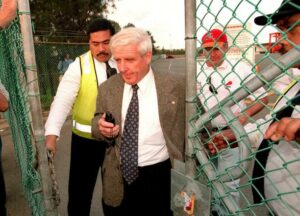
General Protections Claim is awarded $million
Good luck to the CFMEU and their member in General Protections Claim is awarded $million. The CFMEU has a checked history and seems to keep getting fined for their behaviour. In this case they have certainly done some good. so what’s it all about? Why did this claim get a million dollars when most other claims don’t. Read on and see what happened.
Summary
In the recent General Protections claim CFMEU v Hail Creek Coal Pty Ltd.[1] The Federal Court of Australia has awarded an employee damages of $1,272,109 for past and future loss of wages. This substantial pay out under the adverse action provisions of the Fair Work Act. This was was made despite the District Court having previously awarded substantial common law damages for the employee’s work-related injury. General Protections Claim awarded million $
History
Mr Haylett, an employee of the Hail Creek Coal Pty Ltd (HCC), sustained a work related back injury in 2009. He returned to work in a modified role and worked in that role for about 3 years.
On 15 November 2013, the District Court awarded Mr Haylett approximately $637,000 in common law damages for his workplace injury. On 18 November 2013, Mr Haylett undertook a prearranged medical assessment under the Coal Mining Safety and Health Act 1999.
He was assessed as unfit to undertake the duties of his unmodified role. Mr Priestly, HCC’s mine manager, decided to suspend Mr Haylett from employment. This was when he received the results of the medical assessment. Despite Mr Haylett’s successful challenge of the validity of the medical assessment, Mr Haylett was not reinstated to his role.

General protections claim pursued by the union
The CFMEU, on behalf of Mr Haylett, brought a number of claims against HCC. Including that HCC had contravened section 340 of the Fair Work Act (FW Act). This was by failing to pay Mr Haylett wages because he had exercised a number of workplace rights. This included the exercise of Mr Haylett’s workplace right to commence proceedings in the District Court for common law damages in relation to his workplace injury.
In these Federal Court proceedings, Mr Haylett claimed that a reason for his stand down included because he pursued the employer for damages arising from his back injury. (and this was a “workplace right” has was entitled to pursue). Because of the “reverse onus of proof” in adverse action proceedings, the employer had to prove that the reason or reasons Mr Haylett was stood down did not include because he pursued compensation for his injury. The employer maintained that the “primary and only” reason the mine manager stood Mr Haylett down was the need to comply with the CMSH Regulations.

Discharged the onus of proof
The Court was not satisfied that the employer had discharged the onus of proof. In order to show that the workplace rights Mr Haylett exercised was not a reason for its decision to stand him down on 19 November 2013.
The mine manager gave evidence that the “primary and only reason” for his decision to stand Mr Haylett down was the need for the employer to comply with the CMSH Regulations. However, Justice Reeves found the manager to be generally unsatisfactory as a witness.
His Honor specifically held:
- the mine manager had been advised that as a result of Mr Haylett’s compensation for the back injury, the employer’s insurance premiums would rise;
- the decision to stand Mr Haylett down was made in haste. The manager received Dr Parker’s assessment after Mr Haylett was placed on sick leave;
- the purpose of the CMSH Act and Regulations is to protect the safety and health of employees working in the coal mining industry. It is not directed to the operational requirements of coal mining employers;
- the manager said in evidence that he did not know Mr Haylett and he did not know the type of work he was performing at the mine. Notwithstanding this, he did not ask anyone about Mr Haylett’s work activities before making his decision to stand him down. Purportedly for safety reasons;
- the manager did not speak to anyone about the content of the email from Dr Parker. Or seek any advice from the Human Resources Department about any requirements under the CMSH Regulations; and
- the manager could not point out any provision in the CMSH Regulations that required him to act in the manner he did.

Stand down was unlawful adverse action
Due to the fact that the employer could not prove that Mr Haylett’s compensation claim was excluded from the reasons for standing Mr Haylett down. The Court found that Mr Haylett’s stand down was unlawful adverse action. There is no “cap” on compensation that can be awarded for unlawful adverse action and so Mr Haylett was awarded:
- compensation for past and future loss of wages, plus interest, which amounted to $1,296,735; and
- a penalty of $50,000,paid to his union, the CFMEU.
Key Takeaways
Uninformed and ill-advised decision making
This serves as a reminder to employers that evidence of a decision maker’s reasons will be critical for the employer to “prove their innocence”. Usually managers will have to give evidence. Uninformed and ill-advised decision making may lead to contraventions. Care must be taken when making decisions to an employee’s detriment. Even where the decision is well intended, to ensure the decision does not breach any enterprise agreement, modern award or the FW Act.
Having a clear decision making process and documenting appropriate reasons can be key to discharging the reverse onus. With the impending replication of the adverse action jurisdiction to the government sector in Queensland, (now passed).It has never been more important for all workplace decision makers to be able to justify adverse treatment of employees. In making the award, Reeves J considered the interaction between the common law damages award and the award for breach of the FW Act. Reeves J held that those awards had different purposes as:
- the District Court award was an award of damages for loss of earning capacity assessed by reference to the effect his physical injury would have on his future earning capacity; and
- the current award was to compensate Mr Haylett for loss of wages and future income caused by contraventions of the FW Act.

The way in which compensation in such cases is to be calculated
The case is interesting not just for its analysis of the general protections. But also for the judge’s summary of the way in which compensation in such cases is to be calculated. The calculation process can be quite complicated. In Maritime Union of Australia v Fair Work Ombudsman,[2] the Full Court described the exercise that has to be undertaken in assessing an award of compensation under s 545(2), as follows (at [28]):
“The task of the primary judge, having found the relevant contraventions, was to assess the compensation, if any, that was causally related to those contraventions. That involved not an examination of what did happen, but an assessment of what would or might have occurred, but which could no longer occur (because of the contraventions). Subject to any statutory requirement to the contrary, questions of the future or hypothetical effects of a wrong in determining compensation or damages are not to be decided on the balance of probability that they would or would not have happened. Rather, the assessment is by way of the degree of probability of the effects – the probabilities and the possibilities.
Proved on the balance of probability
The above proposition must be qualified by the recognition that, where the fact of injury or loss is part of the cause of action or wrong, it must be proved on the balance of probability. Compensation is generally awarded for loss or damage actually caused or incurred, not potential or likely damage: Insofar as future or hypothetical events are concerned, the High Court described how loss or damage was to be assessed, in the following terms: … Hence the applicant must prove on the balance of probabilities that he or she has sustained some loss or damage.
Loss and damage was sustained
However, in a case such as the present, the applicant shows some loss or damage was sustained by demonstrating that the contravening conduct caused the loss of a commercial opportunity which had some value (not being a negligible value), the value being ascertained by reference to the degree of probabilities or possibilities. It is no answer to that way of viewing an applicant’s case to say that the commercial opportunity was valueless on the balance of probabilities because to say that is to value the commercial opportunity by reference to a standard of proof which is inapplicable.
By its very nature, the calculation of future loss can only be a rough estimate. It cannot be undertaken with mathematical precision. The object is to arrive at an estimate which is “most likely to provide fair and reasonable compensation”.
Maritime Union of Australia v Fair Work Ombudsman,

General Protections Claim is awarded $million
General Protections Claim awarded million $ was a brief article. Pursuing a general protections claim is serious business. Its important you get early advice to work out a strategy to succeed. (medical evidence, witness statement, expert opinions). Its not like when you go to the accountants and hand them a folder or case of receipts and you say let me if I owe or I pay the tax office.
The in tribunal and courts systems you have to prosecute your own claim. The fair work Commission is there to assist you as part of the process. Not advice you, or run your case. You only get out of these cases, whet you put into them. Keep good evidence, try and bring clarity to the situation. Focus on why and the grounds you have lodged your general protections claim.
A lot of applicants get it confused with a unfair dismissal claim. They keep going back to the unfairness of it all. this is not what a general protection claim is about. There’s that old saying you don’t go to a gun fight with a knife. Of course it was unfair the way they treated you, the way they sacked you, that s not the test. Did the employer breach the general protections provisions? (excising workplace rights, discrimination related dismissal) is the real test.
Questions, need advice?
Have questions, need advice, give us a call. Lets work out what best for you. Many general protections claims are based on discriminatory acts by the employer. So there is the possibility to lodge a claim in the various human rights, equal opportunity or anti discrimination boards around the country. Sometimes this is a cheaper and more relevant process. It depends on your claim and what you seek out of the claim, your ability to fund the claim (we do no win, no fee work). Matters around, general protections, adverse actions, workers rights, employments rights, unfair dismissal, we are here for you.
Free call on 1800 333 666
What’s my general protections claim worth
General protections application
Adverse action, what’s it mean
[1] [2016] FCA 199; [2016] FCA 1032.
[2] [2015] FCAFC 120.






